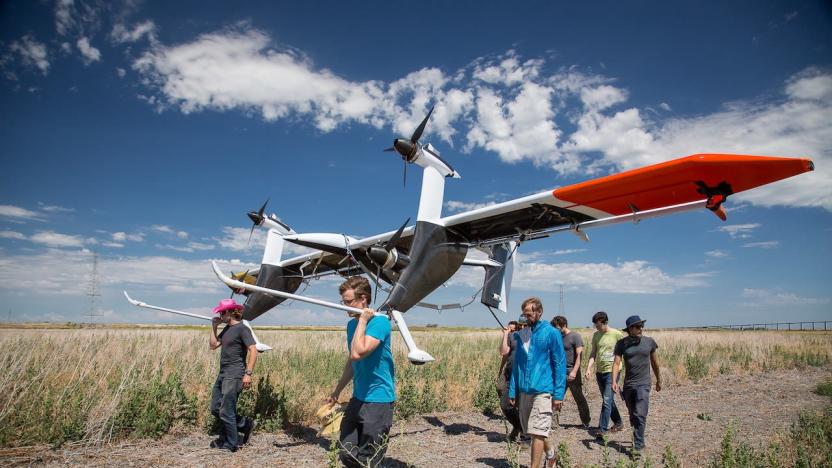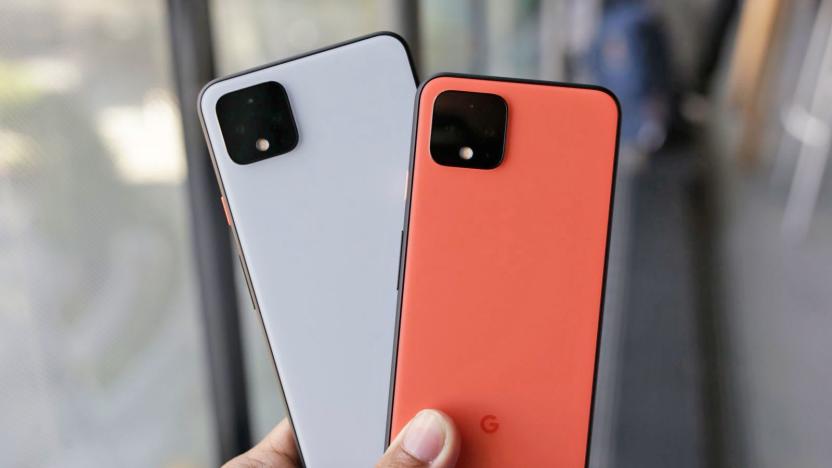Google X
Latest

Google parent Alphabet is pruning its 'other bets'
Alphabet is changing. The Silicon Valley super-company, which serves as an umbrella for Google and smaller, riskier subsidiaries known as "other bets," was established in August 2015. Executives hoped that the reshuffle would satisfy investors, who wanted a better understanding of Google's expanding business portfolio, and encourage each division to become financially successful and independent. At the time, Alphabet had 10 companies under its purview: Google (Search, Android, YouTube and more), Access (Fiber broadband), Calico (aging), Capital (late-stage investment), DeepMind (artificial intelligence), Google Ventures (startup investment), Life Sciences (health), Nest (smart home appliances), Sidewalk (smart cities) and Google X, which still looked after Boston Dynamics (robots), Waymo (self-driving cars), Loon (internet balloons), Wing (delivery drones) and other so-called "moonshot" projects. That list has been amended over the last four and a half years. Many Alphabet companies have simply rebranded -- Life Sciences has become Verily, for instance, Google Ventures is now GV and Google X has dropped the word Google from its name. Of greater importance, however, are the "other bets" that Alphabet has created, killed and casually moved under Google management. Surprisingly, these decisions have accelerated over the last 12 months, highlighting Alphabet's changing ambitions and just how difficult it is to turn a moonshot into a billion-dollar business.

Google needs a sustainable phone moonshot
"Developing sustainable solutions to mass production and consumption is one of the biggest challenges we face today as an industry," Rick Osterloh, Google's senior vice president for devices and services said onstage yesterday. "It impacts all of us and it will for generations to come." Sustainability was a major focus of the Pixel 4 event. The company said it would spend another $150 million on renewable energy projects, for instance, that will generate the same amount of electricity that is currently required to build Made by Google products. Ivy Ross, the head of Google's hardware design team, revealed that all of its 2019 Nest products will include some amount of recycled material, too. The new Nest Mini speaker, for example, has a fabric top made entirely from old plastic bottles.

Google patents creepy smart toys that interact with kids
Nexus Ruxpin? Google's mad science X division is, er, toying with the idea of smart teddy bears in one of its strangest patents yet. In response to junior's voice or movements, "the anthropomorphic device may aim its gaze at the source of the social cue," then "interpret the command (via its servers) and map it to a media control device," according to the document. From there, it could "express curiosity, (it) may tilt its head, furrow its brow, and/or scratch its head with an arm." It added that the device should be "cute" so that "young children may find (it) attractive."

Google is tackling cancer diagnosis next, with magnetic nanoparticles
Google X is always looking for the next moonshot. The semi-secretive lab where the company has tested everything from self-driving cars, to internet broadcasting balloons has had a real fixation on health and longevity recently. The latest project involves using tiny nanoparticles that patrol the body looking for early signs of cancer or other diseases. Basically the particles, which would be just a thousandth of the size of a red blood cell, would be designed to bind to specific cells or proteins. One of the suggested delivery methods is to swallow a particle-packed pill. A magnetic wearable would then attract and count the particles, hopefully delivering an early warning to doctors. Andrew Conrad, head of the Life Sciences team at the Google X, revealed the project at The Wall Street Journal's WSJD Live conference. He said that he hopes this will provide a one-stop-shop for medical testing eventually, but acknowledged that we're probably about five years off from any serious implementation.

Google puts ad revenue to good use with R&D growth
Google isn't a search company or a software developer. Its real business is advertising. Most of the money flowing into Mountain View (and there's quite a lot of it: $16.5 billion this quarter to be exact) comes from ads. The company could simply build up a war chest or snatch up some more startups, but clearly its eyes are on the future. With Larry Page at the helm Google has branched out beyond browsers and mobile operating systems to delivery drones, internet-delivering balloons and whatever Glass is. A year ago Page told investors he wanted to spend more on "speculative" research and development projects. At the time its R&D budget had just seen a $1 billion growth over the previous year. Since then Google has added nearly another $2 billion. Over the first nine months of 2014 has pumped $7 billion dollars into R&D projected, including $2.7 billion in the last quarter alone. Obviously, not all of that money is being funneled into Google X, but it's clear that the experimental arm is adding quite a bit to the company's expenditures. Loon and Calico aren't just about generating goodwill though. Clearly the more consumers Google can reach and the longer those consumers are alive, the more ads it can serve.

Google said to be making giant displays that work like Legos
Many interesting projects have been born inside Google's famous X labs, including smart glasses, balloons capable of distributing internet connectivity and, most recently, a self-driving car. Now, according to The Wall Street Journal, the next big thing that could come out of Google X are giant, modular displays which can connect to create one very large image. Per the report, the project is being developed by Mary Lou Jepsen, co-founder of the One Laptop Per Child initiative and previously a professor at MIT.

Google's peculiar floating barge meets its maker
Remember Google's mysterious floating barge? Well, you probably won't for much longer, because it's met an untimely end. According to the Portland Press Herald, the search giant no longer has a use for the iconic four-story structure, so it's been sold to an anonymous "international barging company" and will be broken down for scrap. It's a rather damp end for the barge, which was set to become a high-tech showroom for inventions like Glass, self-driving cars and other top-secret inventions from Google's X lab, after it first appeared in Portland Harbor late last year. Google's yet to comment on why it's no longer interested in hosting tech-centric cocktail parties, but cost is likely the ultimate factor. It paid $400,000 in property taxes alone to moor the barge on the city's waterfront -- then there's also the small matter of retrofitting its 63 shipping containers into something that Californians would actually want to visit.

Project Glass revealed to have physical trackpad along right arm (video)
Sergey Brin has appeared on The Gavin Newsom Show on Current TV to drop a few more enticing hints about Project Glass. While showing the presenter a picture he'd taken with the AR glasses, he revealed that the prototype is controlled with a trackpad running down the right* arm. He also talked about the device's genesis in Goggle's (pun intended) X Lab, which he described as an "advanced skunkworks" where "far-out projects" are developed -- it's also the department that occupies most of his time. While the units he and his colleagues have been wearing are very rough prototypes, the Google co-founder shared his private hope that the tech will make its way to general release next year. You can catch the extract in full in the video after the break. *Right for the wearer, left for the observer. It depends entirely on your perspective.

Googleplex expansion plans hint at Project X lab, wireless testing facilities
Google's eyeing up some vacant space at the end of its lawn to throw $120 million at a Grand Designs-style extension to its Mountain View campus. Residents will soon see the @Home lab, purportedly to test fully formed consumer devices and whatever secret home entertainment / wireless communications gear we've heard rumblings about. The new development will enable Project X (the interesting one with the James Bond-gizmos, not the lecture series website) to move into a meatier facility where they can perfect projects like Majel and the self-driving car. The most notable development (according to business-types, anyway) is the "Experience Center," a 120,000 square foot private museum / demonstration space for Google to schmooze its most important clients in style (wait, aren't we the most important clients?). VIPs will be invited to play with the newest toys the company can produce before gorging themselves on canapés, or something. Californians wandering past 1600 Shoreline Blvd down the road from the Googleplex, might also notice a new building that's not covered in official branding -- because it's going to be a new wireless testing facility that's being shielded from external signals. At least, that's where we'll be pitching a tent with a couple of long lenses when it opens for business.

Google's mysterious 'Solve for X' launching today? (video)
Google's X Lab is the search giant's top-secret facility even its own employees didn't know about. It's believed to be working on driverless cars, internet connected appliances and Majel: a Star Trek-inspired rebuttal to Siri. It's also apparently behind the Solve for X website, which hints at a TED-style public-presentation site featuring the great and the good talking about "redefining problems into challenges." The video (embedded below) and the site's background seem to agree, given one of the big box-outs reads "What is a Solve for X talk." Richard DeVaul (a member of the "[X] Rapid Evaluation team") mentioned on his Google+ page that the videos would be launching at some point today. Presumably we can expect to see innovative new solutions on dealing with Climate Change, new Cancer Treatments and awkward silence if anyone mentions a Canadian super-soldier program.

Rumor: Google working on Siri competitor codenamed "Majel"
Android and Me has reportedly come across some secret details regarding "Majel," which is Google's voice control project that sounds very similar to the popular Siri. Before you start crying foul that Google is jumping on the voice control bandwagon, don't forget that Google actually included voice controlled actions and search in its own iOS app already, and Android has had functions like voice-to-txt baked in for a while. Of course, those kind of interactions don't hold a candle to the kinds of things that Siri can do, which is why Google is reportedly working on putting together "Majel." The system is named after Majel Barrett-Roddenberry, the wife of Star Trek creator Gene Roddenberry, and the voice for many of the computer interfaces in the sci-fi series. The project is being developed by Google's Google X experimental labs, and when it does finally appear in a way the public can use it, it will likely only do Google Searches. But the final plan is, according to a Google rep in a previous interview, that "every piece of computing surface, everything is voice-aware. It's not that there's a personality, it doesn't have a name, it's just Computer." Sounds interesting. Competition for Siri is a good thing for us users. It sounds like Google is taking a slightly different approach than Apple, and given that Apple actually bought Siri instead of trying to develop it from scratch, odds are that whatever Google puts together might won't exceed Apple's offerings in innovation. But that's fine -- if Google comes up with something really cool, odds are we'll still be able to run both on our iOS devices anyway.





